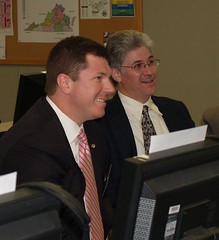Peace Adds Hanover to Measure so County Officials can provide additional real estate tax reliefBill Awaits a Hearing in the State Senate Before Gubernatorial Approval
Working in a bi-partisan manner with Delegate Mamye Bacote (R-Newport News), Del. Christopher K. Peace (R-Hanover) added the County of Hanover to House Bill 698, which would allow Hanover, along with Newport News, to raise the financial worth and income limitations on the real estate tax relief which local governments can offer the elderly and handicapped by local ordinance.
Peace commented, "Meaningful property tax relief is a top priority of this General Assembly. The elderly and disabled on fixed incomes are becoming more and more burdened by rising taxes and have less ability to pay. This bill is good fiscal policy."
The Hanover County Real Estate Tax Relief Program provides discounts on tax bills to elderly or permanently disabled citizens who meet certain income and net worth requirements. The discount applies to the taxes on the value of the house and up to one acre of land, according to Commissioner of Revenue T. Scott Harris.
Applicants must be 65 years of age or permanently and totally disabled on December 31 of the previous year. Disability certification is required. The property for which tax exemption is claimed must be owned or partially owned and lived in by the applicant on December 31 of the previous year. If the applicant is in a hospital or extended care facility, they may still qualify as long as the house is not rented or leased.
Prior to this impending change in law, the gross combined income cannot exceed $50,000. Income of relatives (other than the spouse) living in the house over and above $10,000 must be included in the gross income. Net worth cannot exceed $200,000. The house and up to ten acres are excluded from the $200,000 net worth value. This change in law would increase this threshold income and net worth level to not exceed $62,000 and $350,000, respectively.
Applications are filed annually between January 15 - March 1. Further information and assistance is available from the Commissioner's Office. Our staff will be happy to assist you either over the telephone at (804) 365-6128 or in person. HB 698 is still pending committee assignment in the State Senate.


